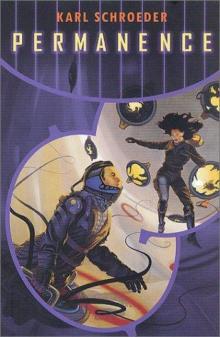- Home
- Karl Schroeder
Ventus Page 13
Ventus Read online
Page 13
At two-and-a-half breaths, he caught himself thinking hey, I can do this! Stop. Back to one.
"Shit." He slapped himself on the forehead. Calandria laughed.
"You're doing well," she said. "You can rest now."
"But I had it once or twice!"
"Good. Don't push it, or you'll get worse rather than better."
He unwove his legs and stood. Two deep breaths, just as she had taught. Jordan felt great, relaxed and able to deal with things. He'd never really felt like this before... oh, maybe when he was really young, and didn't know what the world was like. All his cares and worries seemed distant, and he was able to pay attention to the here-and-now. He smiled, and plunked himself down on the edge of the bed.
"Axel tells me you have quite a mind," Calandria said. "He told me you figured out your own history of the Boros clan by reading their architecture."
"Yeah," he said suspiciously. He and Axel had moved on to talk about that this afternoon, after their conversation about the Winds and 3340 had ended in impasse. Axel had been quite unaware of the contradiction between the Boros' official history and what the stones suggested.
"Do you want to move on to a new study? You must continue to practise what I've taught you, of course."
"Sure!" He felt ready for anything. "What do we do?"
Calandria folded her map and put it aside. "We can build on what you've already learned. If you can relax, you can concentrate. If you can concentrate, you can do marvels."
"Like what?"
"Perfect memory, for instance. Or perfect control of your body, even your heartbeat. Tonight, I'll show you something to help you control your visions."
"I thought that was what I was learning."
"You've been learning how to stop them. Now you'll learn how to make them happen."
Axel looked up, surprise written on his mobile face. "Do we know that?"
"Everything's consistent," she said. "I'd be very surprised if this doesn't work." She motioned for Jordan to sit on the floor, and seated herself in front of him. "Now, close your eyes."
Jordan wasn't sure he wanted to be able to make the visions happen—he was happy that they were going away. But he obeyed. Armiger was not so frightening any more, and if he could stop a vision once it started, the prospect was less daunting.
"Now," Calandria said, "without actually doing it, imagine you are raising your hand in front of your face." He did so. "Examine your imaginary hand. Turn it back and forth. Make a fist." He obeyed. "Look closely at your hand. Picture it as clearly as you can."
Jordan did his best. "Do you keep losing the image?" she asked. He nodded. "Do you get little flashes of other images?"
Puzzled, he sat for a while. Then he realized what she meant: the hand was replaced for a split-second here and there by pictures of inconsequential things, like the washbasin in the corner, or a vista of trees he couldn't identify. "I see it," he said.
"This is what goes on behind everybody's eyes," she said. "A constant flicker of visions. As you practise the counting exercise and your concentration improves, you'll be able to damp them down, and see what you want to see for longer and longer.
"Now, as you've imagined your hand, imagine you can see your entire body. Keep your eyes closed, and look down at yourself." He moved his head, imagining his bent knees and bare feet against the flagstones. "Good. Now, keep your eyes closed, and don't move. Imagine this second body of yours is your own, and stand up in it."
He did. "Look around." Jordan pretended he was standing and looking around the room. It was hard to maintain the images; they kept sliding away. He said so.
"That's okay. Now pretend to turn around. Do you see the bench where Axel's sitting?"
He concentrated. "Yes..." He kept seeing it as a memory, from the position of the bed where he'd sat earlier. He tried to imagine seeing it as if he were standing in the center of the room.
"See his pack on the floor next to it?"
"Yes."
"Go over to the pack. Open it up. Look inside. What do you see?"
He pretended to do as she said. "There's... a knife, a book, a glass liquor bottle."
"How full is the bottle?"
Jordan pretended to hold it up. It seemed to be a quarter full. "A quarter." That was just a fancy, of course; he had no idea what was in Axel's pack.
Calandria said, "Axel, open your pack. Is there a bottle in it?"
"Yeah."
"How full is it?"
"A quarter full, but hey this is just a memory trick. I was drinking from it earlier, you both saw me."
"Jordan, do you remember seeing Axel drink from the bottle earlier?"
"I... I don't know. Maybe."
"Maybe. But you're not sure. And yet you see the bottle, and you know how full it is, and where it is. How strange, hmm?"
A strong exultation gripped Jordan. He had seen it! What he saw with his imagination was somehow real.
"Parlor trick," muttered Axel.
"Be silent!" she commanded. "Now try this. Sit your body down again where your real body sits. Close your imaginary eyes." He did so. "Imagine blackness. Now..."
Her hand touched his shoulder. Jordan struggled to keep his eyes closed. "Practise your deep breathing. Calm yourself, and see deeper and deeper black." He felt the center of his consciousness dropping through his body, to rest finally in his belly, where great strength drove slow breaths in and out.
Calandria's voice had taken on its most hypnotic lilt. "You will open your inner eyes again, but this time, the hand you see before you will not be yours, but rather Armiger's. Do you understand?"
He nodded.
"Open those eyes."
He did so.
§
The ceiling was low, and beamed. He could see the cross- pattern of thatch crooks flickering above that in the firelight.
Armiger sat up. The effort was easier this time. He looked around, fingers opening and closing on the soft cloth which was draped over his naked body.
The woman sat near the fire. Megan, she had called herself. She held a cloth sack draped across her knees, and was just positioning the second of two buckets at her feet. It was probably the scraping sound of the buckets that had woken him.
All Megan's possessions were visible within the one room of this cabin. She had three chairs, a full set of pots, cooking, and fire implements, two hatchets by the door, and a spinning wheel. Chests were wedged into the corners. Dried herbs and kindling hung from the rafters. Everything was rough-hewn, except three items of furniture: the posted bed Armiger now sat in, a fine oaken dining table and, at the wall behind Megan, a wooden cupboard with inlaid patterns of leaves. Yesterday he had lain for a while, too exhausted to move, and examined the pattern on that cupboard from his position here.
Megan was in her thirties. Her hair was grey, her face lined and wind-burnt. She was very strong, though, and still slim under the red peasant dress she wore. Now she plunged her hand into one of the buckets, and brought out a fistful of brown and white feathers. She began riffling through the mass with her other hand.
"What are you doing?" he asked. His voice sounded stronger.
Megan looked up quickly, and smiled. "How are you?"
"Better." He rolled his head, surprising himself when his neck cracked. It never used to do that. He fingered the underside of his jaw. The scar was almost gone. "I'd like to try to walk today."
"Tomorrow. It's evening."
"Oh." She began stuffing feathers into the open end of the sack, and he realized she was making a pillow. "I've been using your bed. I..." He wasn't sure what he was going to say. Thank her for that? But he had been ailing. It was a human thing for her to do, he knew; not that any of his men would have willingly done the same. "Where have you been sleeping?"
"Oh, I slept there with you the first night," she said, looking down at her work. Her hair hid her face. "You were so cold, I thought you might not survive till morning. The last few times, I've used the table. With som
e quilts on it, it's quite fine. The bed's mattress is only straw, anyway."
Armiger imagined her lying on the table, like a body in state. He pushed the image deliberately out of his mind.
"I'm sorry to be a burden to you," he said stiffly.
Megan frowned. "Don't talk like that. It's no trouble, all else I have to take care of is me. And I am fine. Anyway... what else could I do?"
"I was dying," he said, wondering at the thought. "You saved me."
"I've tended the dying before," she said. "Last time, with no hope he'd recover. I had not that hope this time, either. So I am happy, you see, if I could save someone." Her face fell as she thought of something. "At least this time..."
"You lost someone close to you?" He looked around, noticing the fine wooden table and bed-frame. "Your husband."
Megan nodded as she reached for more down. "You see I know about losing things. And about trying to keep them." She looked at him, almost fiercely. "You always lose it in the end—what you want to keep. The harder you try to keep it the more it goes. So now I know how to keep things right."
"How is that?"
"You can never keep a whole thing. But you can keep a part of anything." She looked sadly at the wooden cupboard. "Be it only a piece of furniture. And if you can learn to be content with that, then you can let anything go." Megan stood and walked to the cupboard. She smoothed her hand over the fine wood grain. "I would sit and watch him as he made this. He spent so much time on it. We were in love. When you lose your husband, you think you've lost everything—nothing has any value any more. Funny, how long it took to know that this was still here, and other little things. The parts of him I could keep."
She shrugged, and turned to Armiger. "And what have you lost?"
He felt a surge of rage at the mindless presumption of the question. As if she could comprehend what he'd lost! Well, maybe to her, losing her husband was the equivalent of his own disaster. "I lost my army," he said.
Megan laughed. "And nearly your life. But soldiers don't worry about that sort of thing, do they? I admire that."
He scratched absently at the back of his arm. "Good lady, soldiers worry about nothing else."
She came and sat down on the edge of the bed. He smelled pungent chicken feathers. "Now," she said seriously, "maybe I do believe that. Because you've lost something. More than your way."
Armiger stared at her. There was no way he could talk about this—words could not encompass it, they were too small. The part of him he had communed with had been beyond words, or any of a human's five senses; it had invented senses, and sense, to suit its intimacies.
He wanted to speak to her in thunder, in torn ground and shocked air. Would have, had he only the strength.
Reminded that she had given him what strength he did have, he looked down.
"I think... I did die," he said. It was the only human analogue he could think of. "I died when... She died." She was completely wrong to describe his higher Self; but Megan's people thought their souls were feminine. He struggled to find words, wrapping his arms around himself, glaring past her. "More than a wife. More than a queen. My god died, who gave meaning to more than just my life, who infused everything, the stones, the air, with it."
Megan nodded. "I knew. From things you said in your sleep. From the look of you." She sighed. "Yes, you see, we are together in that."
"No. Not like you." He sat up angrily, feeling sharp stabs of pain in his side. Megan stared at him, patient and undaunted.
He wanted to pierce her calmness, her certainty that her own pain was as great as his. "She wasn't a human being," he said. She was... a Wind."
Megan blinked. Her brow wrinkled, then cleared. "Much is made clear," she said. It was his turn to look surprised. Megan reached out, slowly, and touched the healing scar under his chin. "I know the rites of death," she said. "I have had to perform them myself."
Armiger sat back. His anger was deflated. For some reason, he felt unfulfilled, as if he had lied to her, and not merely told her what she would understand.
Everything was greying out. "Sleep," she said. "My morph."
He lay back, listening to her move about the cabin. Just before he drifted off again, he heard her say, maybe to herself, "And what part of this are you going to keep?"
9
"This may be our last warm night of the year," said Megan the next evening. "It pleases me to see you enjoying it."
Armiger smiled at her. He stood in the center of the clearing next her cottage. The sun had just set, leaving a rose band across the western horizon. The moon Diadem was rising. The moon received its name from the scattering of brilliant white craters on its surface, which made it a dim oval studded with diamond-bright pinpricks of light. On other nights Armiger had praised or cursed those gleaming points, depending on whether night-visibility was to his army's advantage or not. Tonight, possibly for the first time, he was able to admire the sight for its own sake.
He felt content. He knew it was because he was free from all responsibilities during this convalescence.
"Strange," he murmured.
Megan looked up at the moon, then back at him. "What?"
"I should be dead," he said.
She touched his shoulder. "Your wounds were terrible. But they're healing quickly. Isn't that normal for a morph?"
"I'm not exactly a morph," he said wryly. "Just something like one. But yes, you're right." The lie came easily to his lips. Then he thought about it. Could he explain this to a mortal? He would never have thought he had an obligation to try.
Armiger lowered his eyes from the moon, and studied Megan in the pale light. She was a creature he didn't understand. His plans had rarely included women. But she stood next to him now, easy in the cricket-song and darkness, and played none of the dominance games males played. She took her own obligation to him, the wounded soldier, for granted.
"My link to my higher self," he began, then stopped. "It was more than love. We shared an identity. When... she died, I should have died too. Because there was only one of us. Or at least that's what I believed."
Megan nodded. "We all think that of our life's love. But one carries on."
At first Armiger thought she had simply not understood him. Then he thought of another possibility: Megan knew his experiences were not like hers, but she was making an effort to translate them into terms she could understand.
It surprised him to think that she might be spending her time with him doing such an odd kind of work. For it would be work, finding commonality with a stranger's experience. Armiger himself did so only as a way of anticipating the next move of an opponent.
If she'd kept her conclusions to herself, he might have believed she was doing that too. But she shared them.
"Was she killed in the war?" Megan asked.
He started to say no, since this local brushfire he had been involved in had nothing to do with the interstellar conflict that had resulted in his greater self's demise. But he could play the same game as her: what would make sense to her, on an emotional level? "Yes," he said.
"You won't go back to being a soldier, will you?"
He barely heard her. Why am I alive? When his Self died, he should have been extinguished, or at least turned back into an aimless machine.
"I thought I knew what I was," he said. Armiger had pretended to be human since arriving on Ventus. Before that, he recalled bright light and deep vacuum, vision encompassing 360 degrees, radio song in his head, and others' thoughts as well. In that existence, there had been no distinguishing his own mind from those of his companions, the other servants of 3340. And the god's will was the same as their own. The part of that vast identity that was Armiger thought of himself as an extension of the greater whole. He had assumed that when he thought, it was 3340 who was thinking, and when he acted, it was the god acting. It had always been that way.
No, not always...
Suddenly the presence of this woman at his side felt threatening. Something ancient,
a memory perhaps, made him turn away from her. "I need to be alone now," he said. The harsh tone of his own voice surprised him.
"But—" she began. Then she seemed to think better, and turned and walked away quickly.
Armiger glanced back. Humans were biological creatures—mortal animals. For a second there, though, he had touched on some deep-buried feeling within himself. Megan had loomed in the darkness as real as 3340 itself. For an instant, he had... remembered? Remembered standing with someone, a human being, who was every bit his own equal. A creature like himself.
A woman.
And there and then a memory unfolded within Armiger like a long-dormant flower: of himself walking and laughing, a young man with a young woman on his arm, on a world with two moons. On a night like this.
That memory was a thousand years old.
Had he once been human himself? That could explain why 3340 had chosen him for this job. On the other hand, the god could have crafted his personality from the remnants of captured human minds. After all, a memory was nothing more than a synaptic hologram. He was sure 3340 could manufacture any sort of memory for its agents.
Armiger stalked through the long wet grass, swiping at it absently with his hands. The moon and the warmth of the night were forgotten now. He came to the edge of the woods, and turned to pace back the way he'd come, scowling.
If that had been a manufactured memory, why should it remain submerged for so long? He would have expected the god to make only useful memories, and provide them all to his agent's consciousness.
This memory... her hand in his... was an alien thing. He couldn't fit it into his purpose or identity as 3340 had given them to him.
He realized he had been kicking the grass out of his way as he walked, tearing it up by the roots. Armiger stopped, and glanced back at the cottage. Megan stood silhouetted in the doorway.
He ran his hand through his hair. Well. Evidently there was some fragment of human mentality in him. 3340 would not have sent him on this mission were that not the case. It could explain why he was still alive: for some reason 3340 had given him the same instincts for autonomous self-preservation as biological creatures had.

 Ventus
Ventus Sun of Suns v-1
Sun of Suns v-1 Ashes of Candesce: Book Five of Virga
Ashes of Candesce: Book Five of Virga Queen of Candesce v-2
Queen of Candesce v-2 Lady of Mazes
Lady of Mazes Permanence
Permanence